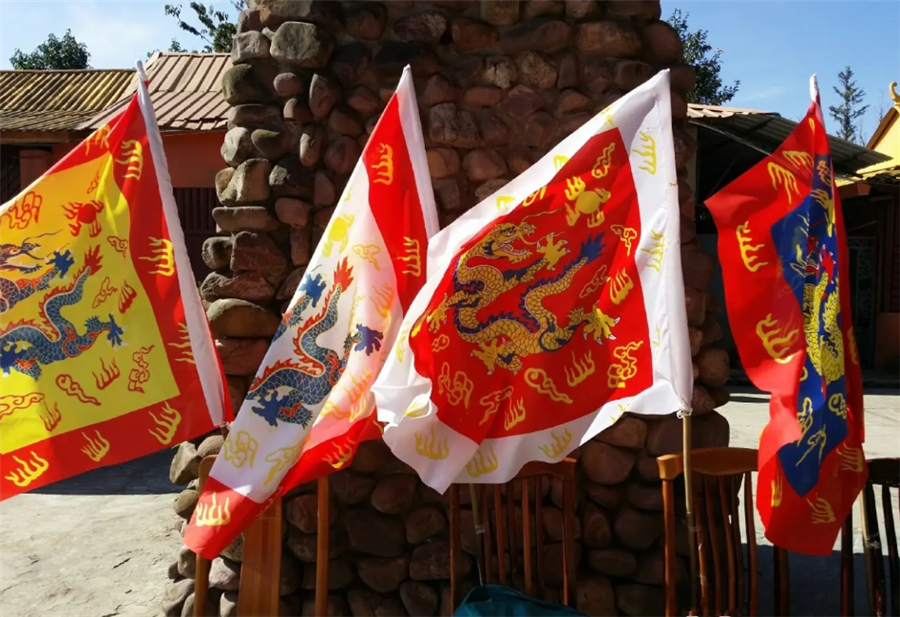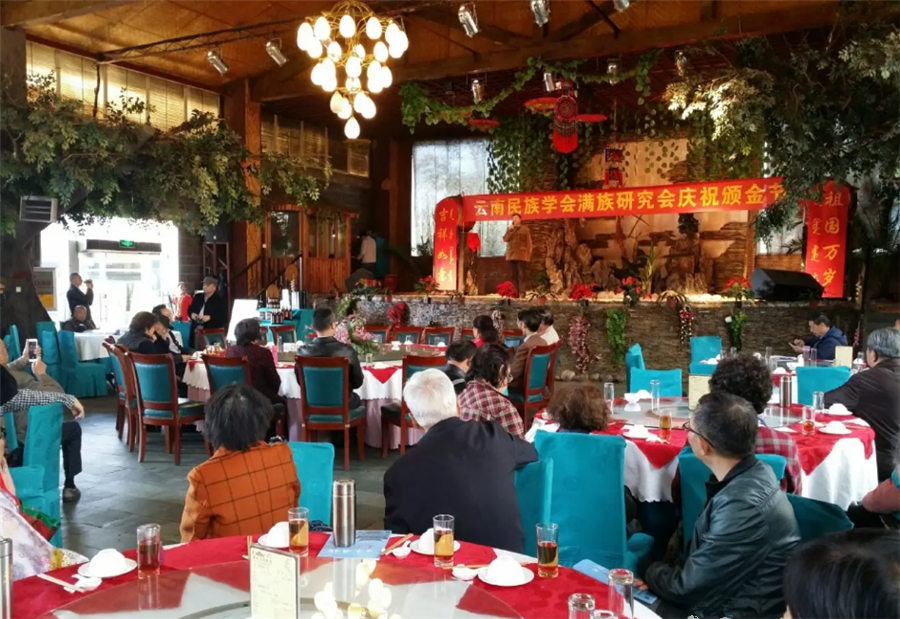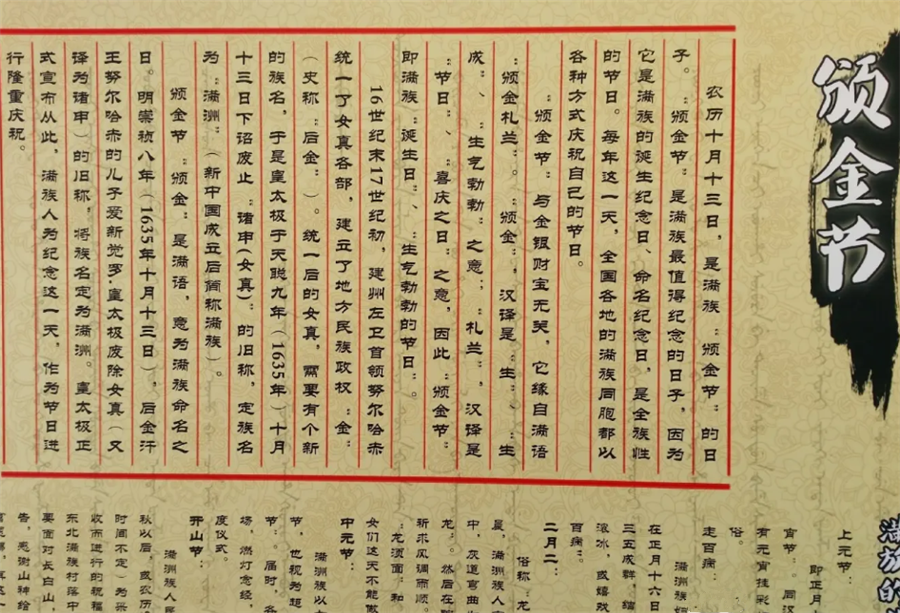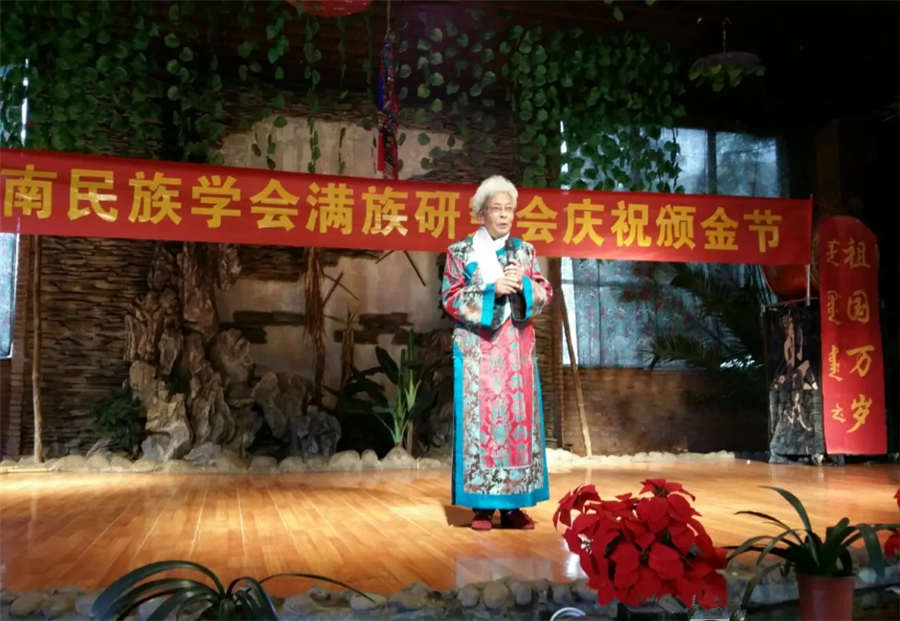
Banjin Festival of Manchu Ethnic Minority
Chinese Name: 满族颁金节
English Name: Banjin Festival of Manchu Ethnic Minority
Festival Date: The thirteenth day of the tenth month of the lunar calendar.
The Banjin Festival (颁金节), also known as the “Manchu Naming Day” or “Manchu Birth Day,” is one of the most important and meaningful traditional festivals for the Manchu ethnic minority in China. It symbolizes the Manchu people’s unity and cultural heritage, and it is celebrated with vibrant activities that emphasize their history, identity, and values.The thirteenth day of the tenth month of the lunar calendar is the day of the Manchu “Banjin Festival.” The “Banjin Festival” is the most significant day for the Manchu people, as it marks the anniversary of their birth and naming, making it a festival celebrated by the entire ethnic group.

Origin and Date of the Festival
Origin
The Banjin Festival traces its roots to 1635, when Emperor Taizong of the Qing Dynasty (清太宗爱新觉罗·皇太极) officially declared that the ethnic group formerly known as the Jurchen (女真) would now be called the Manchu (满洲). This moment marked the Manchu people’s emergence as a distinct ethnic group with a shared identity. The lunar calendar date of October 13th was designated as the Banjin Festival, with “banjin inenggi” meaning “birthday” in Manchu language.
Festival Date
The Banjin Festival is celebrated annually on October 13th of the lunar calendar, a date that commemorates the Manchu people’s cultural and historical origins.

Festival Activities
Traditional Celebrations
Traditional Attire and Dance:
-
On this special day, Manchu people dress in traditional ethnic attire such as qipao (旗袍), ruqun (如裙), and elaborate headpieces. The attire reflects their cultural pride and heritage.
-
Traditional dances like the pearl ball dance (珍珠球舞) and landwork dance (地秧歌) are performed in communal gatherings, celebrating the unity and strength of the Manchu people.
Songs and Rituals:
-
Traditional Manchu songs and dances are performed to honor their ancestors and celebrate the birth of the Manchu people.
-
Shamanistic rituals (萨满祭祀仪式) are conducted by local shamans, who lead ceremonies to invoke the spirits of the ancestors and bless the community.
Traditional Foods:
-
Special dishes are prepared for the occasion, including roast pig (烤猪), rice cakes (打糕), Saqima (萨其玛), and milk tea. These foods are prepared with traditional recipes passed down through generations and are shared among families and neighbors.
Modern Celebrations
Cultural Performances:
-
Today, the Banjin Festival also features cultural performances that showcase Manchu calligraphy, painting, and paper-cutting arts. These performances highlight the artistic achievements of the Manchu people.
Traditional Sports:
-
Manchu sports like snow walking (雪地走) and weihu (赛威呼), traditional sports that represent physical agility and endurance, are organized during the festival to celebrate the Manchu people’s connection with nature and their ancestors.
Academic Conferences and Cultural Exhibitions:
-
To promote Manchu culture, academic conferences and exhibitions are organized to explore the Manchu people’s history, language, and contributions to China’s cultural diversity.


Related Festivals
The Second Day of the Second Month (二月二, “Dragon Head Raising Day”): This festival, also significant to the Manchu, is celebrated with the hope for good weather and a successful harvest. Families perform rituals and eat Dragon Beard Noodles and Dragon Scales Cakes.
Mountain Opening Festival (开山节): Celebrated by the Manchu people in the autumn after the Mid-Autumn Festival, this festival thanks the mountain gods for a good harvest and honors the sacredness of nature.
The Banjin Festival is a powerful reminder of the Manchu people’s cultural pride, historical roots, and deep connection to their identity. Through a blend of traditional ceremonies, arts, and modern celebrations, this festival provides a vibrant expression of the Manchu people’s unity and their significant role in the history of China. As the Manchu people continue to celebrate and preserve their heritage, the Banjin Festival stands as a symbol of their strength, resilience, and cultural legacy.

 7 Days GolfingTour
7 Days GolfingTour
 8 Days Group Tour
8 Days Group Tour
 8 Days Yunnan Tour
8 Days Yunnan Tour
 7 Days Shangri La Hiking
7 Days Shangri La Hiking
 11 Days Yunnan Tour
11 Days Yunnan Tour
 6 Days Yuanyang Terraces
6 Days Yuanyang Terraces
 11 Days Yunnan Tour
11 Days Yunnan Tour
 8 Days South Yunnan
8 Days South Yunnan
 7 Days Tea Tour
7 Days Tea Tour
 8 Days Muslim Tour
8 Days Muslim Tour
 12 Days Self-Driving
12 Days Self-Driving
 4 Days Haba Climbing
4 Days Haba Climbing
 Tiger Leaping Gorge
Tiger Leaping Gorge
 Stone Forest
Stone Forest
 Yunnan-Tibet
Yunnan-Tibet
 Hani Rice Terraces
Hani Rice Terraces
 Kunming
Kunming
 Lijiang
Lijiang
 Shangri-la
Shangri-la
 Dali
Dali
 XishuangBanna
XishuangBanna
 Honghe
Honghe
 Kunming
Kunming
 Lijiang
Lijiang
 Shangri-la
Shangri-la
 Yuanyang Rice Terraces
Yuanyang Rice Terraces
 Nujiang
Nujiang
 XishuangBanna
XishuangBanna
 Spring City Golf
Spring City Golf
 Snow Mountain Golf
Snow Mountain Golf
 Stone Mountain Golf
Stone Mountain Golf
















